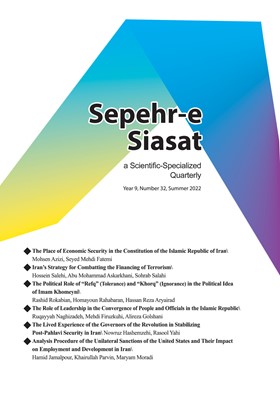The Political Role of “Refq” (Tolerance) and “Khorq” (Ignorance) in the Political Idea of Imam Khomeyni
Subject Areas : Iranian Political Research
Rashid Rekabian
1
*
![]() ,
Homayoun Rahabaran
2
,
Hassan Reza Aryairad
3
,
Homayoun Rahabaran
2
,
Hassan Reza Aryairad
3
1 - Associate Professor, Faculty of Law and Political Sciences, Ayatollah Borujerdi University, Borujerd, Iran
2 - PhD. Student, Department of Political Science, Shahreza Branch, Islamic Azad University, Shahreza, Iran
3 - Assistant Professor, Department of Political Science, Ayatollah Borujerdi University, Borujerd, Iran
Keywords: Makhmourah Nature, Majoubah Nature, Imam Khomeyni, ignorance, Tolerance, Four Causes,
Abstract :
The purpose of the present study is to review the political role of “refq” (tolerance) and “khorq” (ignorance) in the political idea of Imam Khomeyni. The method of study is descriptive-analytic and the model under discussion is presented based on the theory of two natures and with an emphasis on the theoretical framework of the four causes. The research relies on the hypothesis that since “refq” is related to makhmourah nature and is considered as one of the soldiers of reason and belongs to the transcendental philosophical school; and “khorq” is related to Mahjoubah nature and is considered as one the soldiers of ignorance and belongs to the mundane philosophical school, they can lead to the formation of an either transcendental legitimizing or mundane society. The results showed that based on the viewpoint of Imam Khomeyni, the actualization of moral politics refers to opening of hearts and that the governments and societies need to actualize tolerance and avoid violence. Therefore, such governments consider power as a means to serve the society and make it achieve prosperity.
قرآن کریم.
نهجالبلاغه.
ابن منظور، محمد بن مکرّم (1414ق). لسان العرب. بیروت: دار صادر، ج 5.
اربلی، ابی الحسن علی بن عیسی (۱۳۸۱ق). کشف الغمة فی معرفة الأئمه. با تعلیق هاشم رسولی محلاتی. تبریز: مکتبة بنیهاشمی، ج1.
برقی، احمد بن محمد (1371ق). المحاسن. قم: دارالکتب الاسلامیه، ج1.
جعفریان، رسول (1377). تاریخ تشیع در ایران. تهران: علم، ج1.
خمینی، سید روحالله (1378). شرح حدیث «جنود عقل و جهل». تهران: مؤسسه تنظیم و نشر آثار امام خمینى.
خمینی، سید روحالله (1380). صحیفه امام. تهران: موسسه تنظیم و نشر آثار امام خمینی، ج5، 9، 7.
خمینی، سید روحالله (1382). تقریرات درس فلسفه. تقریر سیدعبدالغنى اردبیلى. تهران: مؤسسه تنظیم و نشر آثار امام خمینى.
خمینی، سید روحالله (1390). تفسیر سوره حمد. تهران: موسسه تنظیم و نشر آثار امام خمینی.
دلشاد تهرانی، مصطفی (1387). دولت آفتاب، اندیشه سیاسی و سیره حکومتی علی(ع). تهران: خانه اندیشه جوان.
دهخدا، علیاکبر (1385). لغتنامه دهخدا. تهران: دانشگاه تهران، ج2.
رشاد، علیاکبر (1389). دانشنامه امام علی(ع). تهران: پژوهشگاه فرهنگ و اندیشه اسلامی، ج6.
زرینکوب، عبدالحسین (1355). کارنامه اسلام. تهران: امیرکبیر.
طبرسى، فضل بن حسن (1377). مکارم الاخلاق. قم: شریف رضی.
طبری، ابوجعفر محمد بن جریر (1385ق). تاریخ طبری (تاریخ الرسل و الملوک). ترجمه ابوالقاسم پاینده. تهران: اساطیر، چاپ سوم.
فاضل میبدی، محمدتقی (1378). دین و دولت از نگاه امام خمینی. مفید، شماره20، ص103-120.
فیض کاشانى، محمدمحسن (1419ق). تفسیر الصافی. بیروت: دارالغرب الاسلامی، چاپ دوم.
کاتوزیان، ناصر (1388). فلسفه حقوق. تهران: شرکت سهامی انتشار، ج1.
کلینی، محمد (1365). اصول کافی. تهران: دارالکتب الاسلامیه، ج2-1.
لاک، جان (1390). رسالهای درباره حکومت. ترجمه حمید عضدانلو. تهران: نی.
لکزایی، نجف (1389). ﻓﻠﺴﻔﻪ امنیت از دﻳﺪﮔﺎه اﻣﺎم خمینی. مطالعات راهبردی، شماره49، ص5-29.
مازندرانى، محمد صالح بن احمد (1382). شرح الکافی- الأصول و الروضة. موسسه تحقیقات و نشر معارف اهل بیت، ج1.
متقی هندی، علاءالدین علی بن حسام (1414ق). کنز العمال. بیروت: دار احیاء التراث العربی، ج6.
محدث نوری، حسین (1408ق). مستدرک الوسائل. بیروت: آل البیت لاحیاءالتراث، ج12.
معین، محمد (1377). فرهنگ فارسی. تهران: چاپخانه سپهر.
_||_

